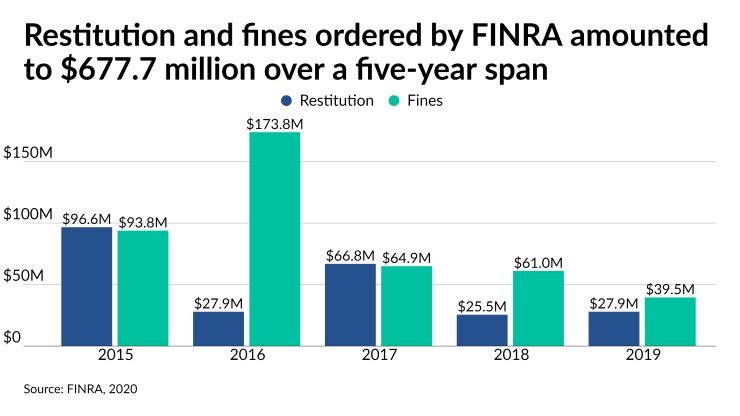A 37-year veteran broker lost his job and FINRA registration due to an investigation into the barred father of another former advisor from the same firm.
William J. Novack declined to testify and agreed to the ban after FINRA contacted him about the other ex-Cambridge Investment Research advisor’s termination,
The case marks the latest phase of a two-year saga involving Lafayette, Indiana-based Schumaker Financial and brings to the fore the issue of barred brokers within family businesses. In addition, it displays the far-reaching implications of $8,200 that was temporarily missing from a homeowners association and a broker’s decision seven years ago not to respond to FINRA.
Last month, James A. Schumaker
Novack and the younger Schumaker had moved on to different wealth managers in 2019, but Novack’s next firm, CFD Investments, permitted him to resign Jan. 25,
CFD cited Novack’s “explanation of the facts and circumstances regarding the FINRA inquiry relating to James Schumaker” and his acknowledging “potential violations” of rules about payments to unregistered persons and the protection of customer records and information.
The attorney representing Novack before FINRA didn’t respond to requests for comment, while representatives for Kokomo, Indiana-based CFD declined to comment.
The younger Schumaker also declined to discuss the case when contacted at his and his father’s office, where the elder Schumaker is listed as president and CEO. The RIA where James Schumaker registered after his termination from Cambridge, Lafayette-based Optivise Advisory Services, didn’t respond to requests for comment.
Representatives for Cambridge didn’t respond to inquiries, either. A FINRA spokesman declined to discuss the case beyond what’s available in BrokerCheck.
The regulator could have imposed a full bar on James Schumaker — rather than a nine-month suspension and $5,000 fine — after Cambridge auditors allegedly discovered his father at the office twice in a three-month span, according to securities attorney Bill Singer.
Singer wrote
The potential damages can be “exponential” if clients suffer losses under a broker who’s already barred and didn’t disclose it to clients, according to Singer.
“What happens then is they file a lawsuit, and who do they sue? They sue Cambridge. Why? Because they have deep pockets,” Singer says. “These things really scare the brokerage firms, and that's why I bring up Renaissance, because these are not unusual situations.”
Homeowner association origins
Still, the case stems from notably small origins. In 2014, Jeffrey Schumaker’s broker-dealer at the time, Transamerica Financial Advisors, discharged him after the firm found out he had misappropriated $8,200 from a homeowners association and later paid it back,
Four years later, Schumaker’s son James affiliated with Cambridge and became the broker of record for his father’s former clients,
“Nevertheless, when Cambridge performed a second audit in February 2019, it found Schumaker’s father on the premises in a meeting with Schumaker and a brokerage customer in the conference room,” according to the letter of acceptance, waiver and consent.
The younger Schumaker started in the industry in 2018 with OneAmerica Securities, where the third advisor, Novack, was also registered before moving to Cambridge that year. With no other regulatory disclosures besides this case over four decades, Novack also had tenures with Signator Investors, Transamerica, O.N. Equity Sales and Prudential, BrokerCheck shows.
On Feb. 26, FINRA sent Novack a request for on-the-record testimony about the termination of a Cambridge representative “whom the Firm had reason to believe was permitting and enabling a barred individual to conduct a securities business,” Novack’s settlement







